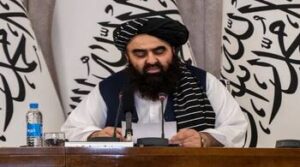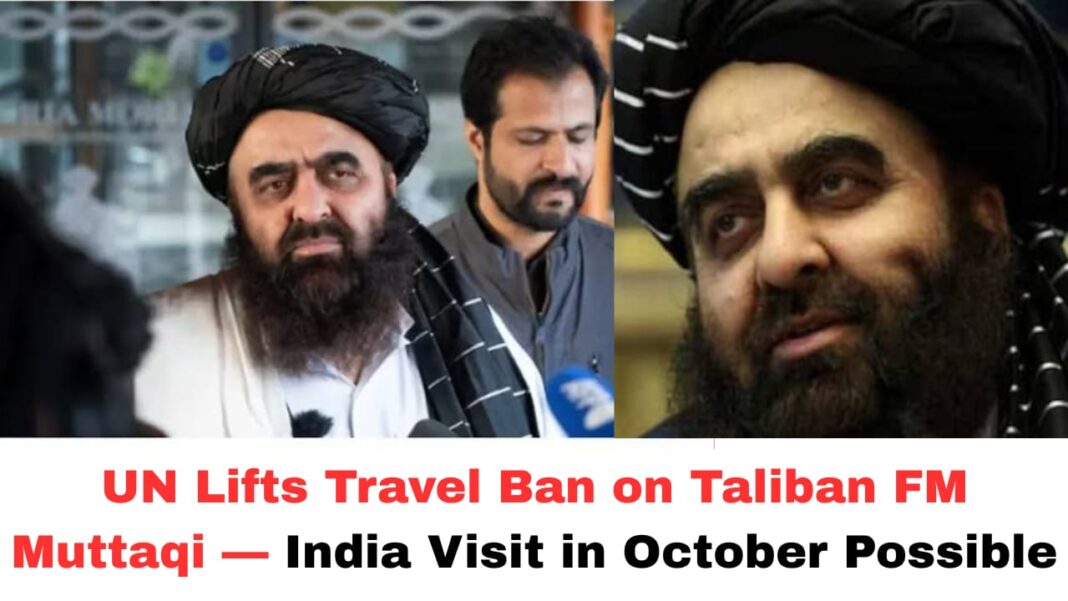Digital News Guru National Desk:
A Diplomatic Shift? UN Lifts Travel Ban on Taliban FM, Opening Door to Possible Visit to India
In a striking development in South Asia’s complex diplomatic theatre, the United Nations Security Council has temporarily lifted the travel ban on Afghan Taliban Foreign Minister Amir Khan Muttaqi. The exemption paves the way for a potential visit to India between October 9 and 16, 2025, which, if it takes place, would mark the first high-level visit by a Taliban leader to Delhi since the Taliban’s takeover of Kabul in 2021.
While India’s Ministry of External Affairs has not formally confirmed the meeting, it has acknowledged the UNSC’s move and noted ongoing dialogue with Afghanistan. According to Afghan sources, the agenda for Muttaqi’s possible trip includes bilateral cooperation on trade, health, consular services, and port access.

Background: From Sanctions to Exemption
Following the Taliban’s return to power in August 2021, several of its leaders, including Muttaqi, became subject to UN sanctions — including travel bans and asset freezes — under Resolution 1988. These restrictions have often hampered the Taliban’s diplomatic outreach beyond Afghanistan’s borders. Previously planned trips were blocked when waiver requests failed to receive Security Council approval.
On September 30, 2025, the UN Security Council Committee specifically approved a temporary exemption to the travel ban for Muttaqi’s proposed travel to India. The allowed window spans October 9–16.
This latest waiver suggests a softening in the UN’s posture toward facilitating limited diplomacy, even with governments or groups that remain under sanctions — provided the trip is framed within clear, controlled parameters.
Why India? Strategic Interests and Hidden Constraints
Although India has not formally recognized the Taliban regime, it has maintained discreet channels to safeguard its interests, especially in humanitarian, developmental, and security spheres. After its embassy in Kabul was shut in 2021, India reopened a technical mission in 2022 to oversee aid operations and ensure minimal diplomatic presence.
Key motivations behind considering a meeting with Muttaqi include:
- Trade and commerce: Afghanistan’s economy remains fragile, and India may push to revive imports (e.g. dry fruits) or bilateral exchanges via ports.
- Humanitarian & health issues: India has provided assistance to Afghanistan following disasters, and cooperation in health or infrastructure would be timely.
- Consular and people-to-people concerns: Longstanding Afghan diaspora, student, and medical travel ties need mechanisms for smoother transitions.
- Regional diplomacy & signaling: A controlled, symbolic engagement with the Taliban may allow India to assert its influence in South Asia and mitigate marginalization from evolving Afghan ties with Pakistan, Iran, or China.
- Balancing constraints: India must carefully maintain its stance regarding human rights, counterterrorism, and not granting outright legitimacy. The tentative nature of the visit, and prior nonrecognition stance, gives Delhi some diplomatic flexibility.
Still, such a visit would not be without sensitivities. India’s posture must reconcile domestic public opinion (especially on issues of women’s rights under Taliban rule), the expectations of its security establishment, and its relations with regional powers.

Regional Ripples & Geopolitical Implications
Muttaqi’s possible transit through Russia, ahead of a New Delhi trip, is notable. He is expected to join a “Moscow Format” meeting involving regional stakeholders to discuss Afghanistan’s future. Such meetings often bring in China, Iran, Pakistan, and Central Asian states, and provide a forum for Afghan diplomacy beyond direct US or Western influence.
Only Russia has formally recognized the Taliban government so far; most other nations, including India, maintain limited engagement without formal diplomatic recognition. The visit (if it happens) could subtly shift the regional balance of diplomatic traction toward Afghanistan under the Taliban’s current setup.
Other neighboring countries and global powers will watch this closely. Pakistan has historically had deep links with the Afghan Taliban, and any pivot by India will be scrutinized. China, which has sizable investments in Afghanistan, may interpret India’s engagement as a signal of its willingness to reenter Afghan diplomacy in a more pronounced way.
Challenges & Risks
- Legitimacy vs. engagement: The biggest challenge for India is walking the fine line between extending engagement for pragmatic reasons and being accused of de facto recognition of a regime with deeply controversial policies (especially on human rights, women’s freedoms, minority protections).
- Domestic politics: There could be criticism within India over giving legitimacy to a government many Indians view with skepticism or hostility. The government must manage public perception carefully.
- Security concerns: Afghanistan remains a hotbed of militant groups. Any misstep or perceived endorsement could carry backlash. Also, intelligence-sharing and border security will be key parts of any negotiation.
- Diplomatic backlash: Countries that oppose diplomatic normalization with the Taliban may criticize India’s move or question its that it is undermining pressure for reforms.
- Implementation hurdles: Even with an exemption, logistics, visa processing, security undertakings, and the final agreement of the date and agenda are not trivial. In past attempts, waiver approvals slipped or were blocked at the UN level.
What to Watch
- Official Indian confirmation: Whether the MEA will publicly confirm the dates, agenda, and status of the visit (beyond “ongoing dialogue”)
- Statements from Afghan side: Which ministers or officials accompany Muttaqi, and what tone is struck in public messaging
- Agreed deliverables: Are any memoranda of understanding (MoUs) or agreements signed — in trade, transit, health, or port access
- International reactions: Responses from the United States, EU, Pakistan, China, and regional blocs
- Domestic commentary: How Indian media, analysts, opposition parties, and civil society frame the visit
Conclusion
The UNSC’s decision to temporarily lift the travel ban on Amir Khan Muttaqi represents a subtle but significant opening in the diplomatic isolation around the Taliban regime. India’s possible hosting of a high-level Taliban minister would mark a distinct shift in its Afghan policy — not full recognition, but calibrated engagement grounded in strategic interests.
If the trip materializes, it may be remembered not as a dramatic realignment, but as a measured gesture: a test of how India, the Taliban regime, and regional actors navigate a cautious rapprochement in one of the most sensitive diplomatic contexts of recent years.
You May Also Read: ISSA Awards India for Expanding Social Protection to 940 Million People









